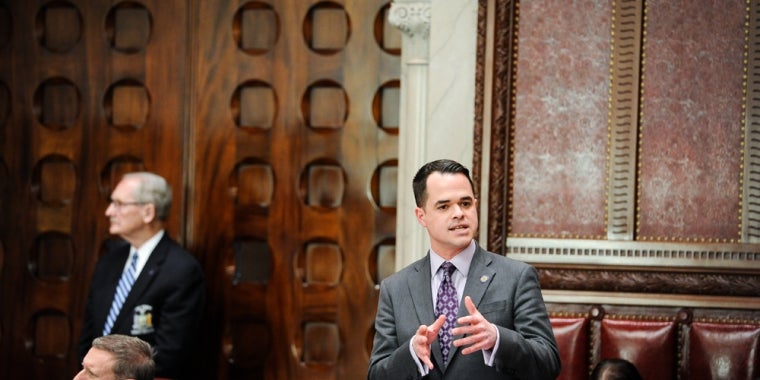
School Mandate Relief Proposal
David Carlucci
February 15, 2011

Senator Carlucci Releases
School Mandate Relief Plan
Regional Collective Bargaining among measures to lower costs, preserve educational quality
(Albany, NY) Senator David Carlucci (D-Rockland) today introduced a mandate relief package that will help schools reduce costs, maintain educational quality and ultimately help with the implementation of a tax cap.
“It's time to put aside the explosive rhetoric and work as a team with our educators and school administrators to do more with less,” Senator David Carlucci (D-Rockland) said. “No one wants to lessen the quality of our education and working together we can continue to lower costs while improving results. These common sense solutions will allow school districts to make the best use of their financial resources without treating our taxpayers like limitless cash machines.”
Senator Carlucci previously released a mandate relief package for local governments.
The legislative package includes:
- Allowing Regional Collective Bargaining
Currently, each of the nearly 700 school districts in New York separately negotiate their own collective bargaining agreements. This is despite the fact that teachers, and some other employees, are organized at the state level. The IDC is introducing legislation that will level the playing field. It will create a voluntary system to allow neighboring districts to band together, share information better and jointly negotiate future contracts that will end up saving taxpayer money.
- Giving New Flexibility in Purchasing Contracts
New York is currently one of only three states that do not allow cooperative contract use. Allowing schools and local municipalities to join out-of-state and national procurement cooperatives has proven successful in other states and has led to significant cost savings. The IDC has introduced legislation (S.624) to give school districts and local governmental entities the ability to consider favorable contractual purchasing conditions outside New York State and to "piggy-back" on to those contracts. Cooperative contracts provide a 10 to 15 percent cost savings per contract. Reform of these purchasing rules has the ability to save New York taxpayers $2 billion per-year, according to the New York State School Board Association.
- Freeing Up Excess Reserve Funds
- A 2008 audit by the State Comptroller's Office found that school districts have collected as much as $407 million more than was needed for their Employee Benefit Accrued Liability Reserve funds. These funds, used to pay employees for accrued leave time due to them when they leave district employment, currently have restrictions placed on them that prohibit even excess money from being used for other purposes. The IDC has introduced legislation, (S.1524), that would allow districts with excess funds in their EBALR accounts to use those funds to help support schools and lower the tax levy. The IDC recommends that, if this measure becomes law, these excess funds be used to pay one-time expenses – such as capital projects --– pay off debt, or finance other post-employment benefits that would provide taxpayers relief today and reduce future costs.
- Breaking Down Barriers to Share Services and Consolidate Healthcare Initiatives
The IDC has introduced legislation (S.2843) that streamlines the process for schools and other local governments to join together to consolidate administration and healthcare administration operations. These efforts would cut down on duplicative services, increase purchasing power in order to drive down costs, and allow schools access to the Healthy NY program. On average, Healthy NY is 7 percent cheaper than other health insurance products.
Additionally, the IDC makes the following recommendations to the Governor's Mandate Relief Design Team:
- Enforce current laws that allow school districts to be customers of the New York Power Authority, making them eligible for lower energy-related costs. Currently, not all districts who seek this benefit are receiving them.
- Return curriculum decisions to local districts.
- Revamp the Payment In Lieu of Taxes process to ensure that any PILOT agreement includes an equitable payment to the local school district.



